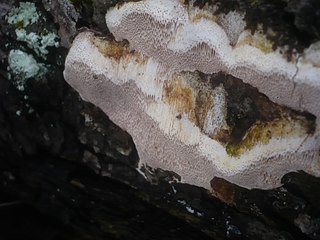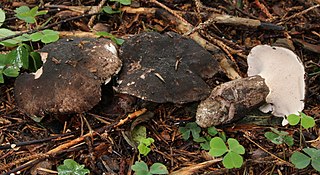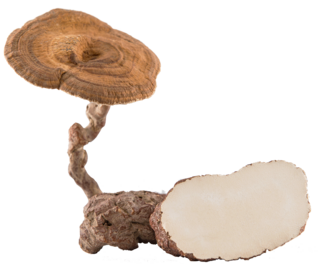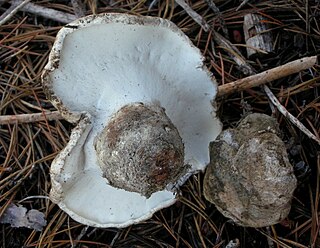
Junghuhnia is a genus of crust fungi in the family Steccherinaceae. It was circumscribed by Czech mycologist August Carl Joseph Corda in 1842. The generic name honours German-Dutch botanist Franz Wilhelm Junghuhn.

The Polyporaceae are a family of poroid fungi belonging to the Basidiomycota. The flesh of their fruit bodies varies from soft to very tough. Most members of this family have their hymenium in vertical pores on the underside of the caps, but some of them have gills or gill-like structures. Many species are brackets, but others have a definite stipe – for example, Polyporus badius.

Perenniporia is a cosmopolitan genus of bracket-forming or crust-like polypores in the family Polyporaceae. They are dimitic or trimitic with smooth, thick-walled basidiospores and cause a white rot in affected wood.

Oxyporus is a genus of polypore fungi in the family Schizoporaceae. An individual family Oxyporaceae was described for the genus. A number of species in this genus are plant pathogens, causing a white rot. The genus is widely distributed.

The Phanerochaetaceae are a family of mostly crust fungi in the order Polyporales.

Postia is a genus of brown rot fungi in the family Fomitopsidaceae.

Phylloporia is a genus of polypore fungi in the family Hymenochaetaceae. A 2012 estimate placed 23 species in the genus; this number was increased to 30 by 2015.

Boletopsis is a genus of mycorrhizal fungi in the family Bankeraceae. The genus was circumscribed by Swiss mycologist Victor Fayod in 1889, with Boletopsis leucomelaena as the type species.

Antrodia is a genus of fungi in the family Fomitopsidaceae. Antrodia species have fruit bodies that typically resupinate, with the hymenium exposed to the outside; the edges may be turned so as to form narrow brackets. Most species are found in temperate and boreal forests, and cause brown rot.

Mycoacia is a genus of toothed crust fungi in the family Meruliaceae. It was circumscribed by Dutch mycologist Marinus Anton Donk in 1931.

Gloeoporus is a genus of crust fungi in the family Irpicaceae. The genus has a widespread distribution.

Antrodiella is a genus of fungi in the family Steccherinaceae of the order Polyporales.

Coriolopsis is a genus of fungi in the family Polyporaceae. It was circumscribed by American mycologist William Alphonso Murrill in 1905. The genus is cosmopolitan, with most species in tropical areas. The generic name combines the name Coriolus with the Ancient Greek word ὄψις ("appearance").

Dichomitus is a genus of poroid crust fungi in the family Polyporaceae. It was circumscribed by English mycologist Derek Reid in 1965.
Grammothele is a genus of poroid crust fungi in the family Polyporaceae.
Grammothelopsis is a fungal genus in the family Polyporaceae. It was circumscribed in 1982 by Swiss mycologist Walter Jülich, with Grammothelopsis macrospora as the type species.

Skeletocutis is a genus of about 40 species of poroid fungi in the family Polyporaceae. The genus has a cosmopolitan distribution, although most species are found in the Northern Hemisphere. It causes a white rot in a diverse array of woody substrates, and the fruit bodies grow as a crust on the surface of the decaying wood. Sometimes the edges of the crust are turned outward to form rudimentary bracket-like caps.

Lignosus rhinocerus, commonly known as tiger milk mushroom, belongs to family Polyporaceae in the division Basidiomycota. This fungus is geographically distributed only in tropical rainforests in the region of South China, Thailand, Malaysia, Indonesia, Philippines and Papua New Guinea.

Boletopsis grisea is a species of fungus in the family Bankeraceae. The fruit bodies are gray, fleshy polypores that grow on the ground in a mycorrhizal association with Scots pine. It is found in Asia, North America, and Europe.

Cerrena zonata is a species of poroid fungus in the genus Cerrena.

















